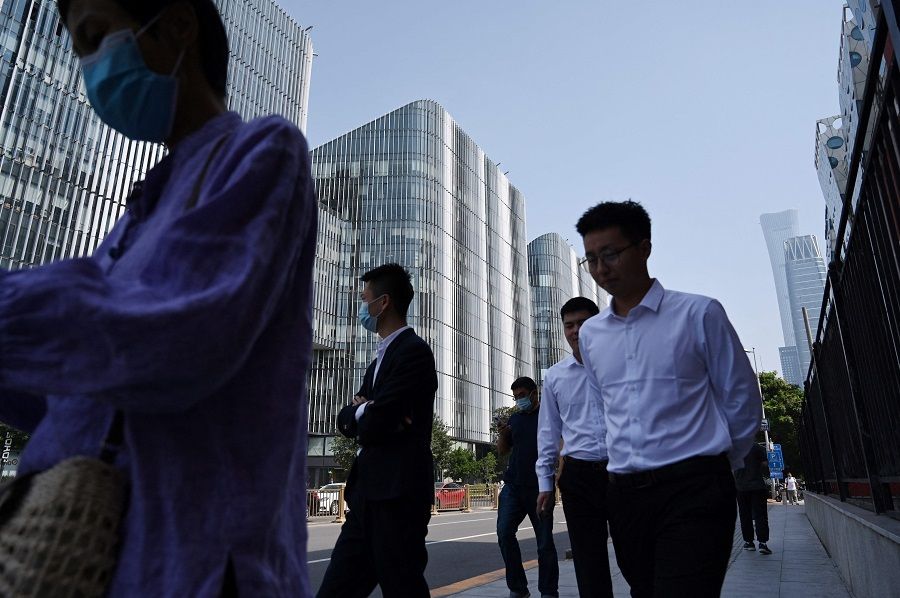Every individual counts: China should go for 'common development' rather than 'common prosperity'

Recently, China's emphasis on "common prosperity" and its measures to regulate the disorderly expansion of capital have attracted global attention. The creation, concentration and redistribution of wealth, as well as the closely related topic of social justice, are issues faced by countries around the world. But it seems that no country has come up with a perfect solution.
The Chinese government has implemented large-scale poverty alleviation programmes under the Chinese system in recent years, based on a whole-of-nation approach. It has facilitated intergovernmental fiscal transfers to reduce disparities between developed and underdeveloped provinces, achieving significant achievements in rural revitalisation. As a major developing power with uneven regional development, China's proactive coordination at a macro level reflects its unique institutional advantages.
American society has long been dissatisfied with serious income polarisation but there seems to be no solution.
While regional disparities in the US are relatively smaller, the income gap across various social classes is widening. According to statistics from a US website focusing on labour rights, the average annual salary (including vested stock awards) of CEOs of S&P 500 companies topped US$21.3 million in 2019, a whopping 320 times that of typical workers. In 1965, the average annual salary of the CEOs of top US firms was only 21 times the annual salary of typical workers. The report stated that "CEOs are getting more because of their power to set pay", or in other words, they make use of their privileges to pay themselves more. American society has long been dissatisfied with serious income polarisation but there seems to be no solution.

A move to the market was good for China
China is transitioning from a planned to a market economy and it is only reasonable for the founders and managers of its enterprises to receive reasonably high rewards. A market-oriented economy would create a society capable of producing successful and charismatic entrepreneurs, who would not have otherwise emerged in a traditional command economy.
During the transition from a Maoist planned economy to a socialist market economy in the Deng Xiaoping era, some outstanding Chinese entrepreneurs also transitioned from being state-owned factory managers to modern entrepreneurs. They include Zhang Ruimin, founder of Haier Group, Chu Shijiang, former chairman of Hongta Tobacco (Group) Co., Ltd, and so on. While the property rights relationship between these transitioned entrepreneurs and the state-owned enterprises they served are complicated, one thing is certain: their operational management skills can only be fully realised under the market economy as they are able to leave their personal imprints on their companies. Thus, the market economy as the best system maximising human potential is not only proven by modern history but also by China's reform and opening up.
Reforms and marketisation have also witnessed the birth of grassroots entrepreneurs who built their business empire from scratch, such as the legendary Tao Huabi, who founded Lao Gan Ma (老干妈) chilli sauce, the late Qin Yuanhong, founder of Chongqing's Qin Ma hotpot (秦妈火锅), and a group of highly educated founders of hi-tech or e-commerce enterprises. These success stories prove that an open and free entrepreneurial environment stimulates the potential of individuals, regardless of their age, educational background or experience. Not only that, it helps realise dreams, increases society's wealth, creates job opportunities and changes people's lives.
The individual's outstanding qualities and a conducive social environment are both necessary in the making of a successful entrepreneur, and society should cherish and admire its leading entrepreneurs.
To some extent, the business world under a market economy is much more open than other sectors that also offers routes to success. It provides people who have less education or poor family backgrounds the opportunity for self-actualisation. Successful businessmen are often risk takers and innovators, possessing shrewdness, acumen, and foresight. Many have good people skills and make effective leaders.

Environment for businessmen to flourish
The individual's outstanding qualities and a conducive social environment are both necessary in the making of a successful entrepreneur, and society should cherish and admire its leading entrepreneurs. Two friends with vast entrepreneurial experience shared the following with me separately: businessmen often think much further ahead than governments. One of them, who is active in both China and the US, said that this trait is found in both Chinese and American businessmen. The business world is like a battlefield - high mental acuity in dealing with sudden changes ensures survival and growth. Compared to government officials, it is essential that entrepreneurs have a solid grasp of reality in order to react in good time.
In the early phases of starting a business, entrepreneurs could be driven by their need to survive and a dream. Many may not have expected to accumulate such mind-boggling wealth in a short span of 20 years. But when massive wealth accumulation becomes a fact, entrepreneurs inevitably face reasonable doubts from society - first about the true source of their wealth, and second about wealth distribution and giving back to society.

Realistically speaking, it seems difficult to hold entrepreneurs, whether as individuals or a group, to high moral standards. After all, the top priority of commercial activities is to make a profit, which is an inherently self-centred and greedy behaviour. Businessmen are often people who have a passion for money, and it is impossible for all of their money-making methods to pass strict ethical tests. What the state can do is to strictly implement legislation and law enforcement, especially in areas involving personal safety, food safety, copyright protection and so on.
The redistribution of wealth aimed at achieving social justice is an even bigger challenge; wealthy Americans have ways of evading taxation within the law, which means tax policy adjustments largely affect middle-class workers whose sources of income are completely transparent. Additionally, CEOs are also able to set sky-high pays for themselves, posing another difficult challenge for American society.
To be fair, the rich are given to philanthropy
However, we can also see how entrepreneurs in other countries have taken the initiative to give back to society.
For example, wealthy businessmen have donated funds to build private American universities such as Stanford University, Cornell University, Duke University and Carnegie Mellon University. Driven by ideals of philanthropy and education, these entrepreneurs wanted to establish unique higher education institutions in their regions.
The founders of Cornell University wanted to build a new kind of university in upstate New York and was the first to introduce a practical professional degree, the hospitality major, in an elite American research university. The university's School of Hotel Administration later became a top-ranked hospitality management school in the world.
The Duke family that founded Duke University amassed massive wealth in the early 20th century from the manufacture of tobacco products and electricity generation. Driven by religion and charitable causes, they funded the expansion of the Trinity College into the current Duke University in 1924.
In South Korea, Samsung Group became the exclusive donor of a private Korean university, Sungkyunkwan University, in 1996. From what I know, the Sungkyun Journal of East Asian Studies that Sungkyunkwan University's Academy of East Asian Studies publishes is one of the few academic journals that pays high fees to authors. Currently, this reputable publication is published and distributed by the prestigious Duke University Press.

While the investments of entrepreneurs and their families in education, academia, and museums cannot achieve the goal of common prosperity in the short term, it indirectly provides an important means for next-generation talents to achieve upward social mobility through education, in addition to providing countless job opportunities in universities. Such donations have a positive effect on satisfying an entrepreneur's personal charitable ideals, implementing educational values, consolidating the family's reputation, and enhancing social progress. By doing so, entrepreneurs are not only amassing wealth for themselves and their descendants but also realising a higher spiritual goal.
While the situation is far from perfect and may never be perfect, the various efforts that American society has put into achieving social justice are still apparent.
How to encourage the wealthy to do more for the right reasons
Hence, the more important and practical thing to do is not so much narrowing the wealth gap between the rich and poor but encouraging the wealthy to invest their accumulated wealth in projects that promote social justice and progress to indirectly and effectively enhance relative social mobility and social justice in the long run.
American enterprises have an obligation to donate to charity and have relevant departments that deal with corporate donations. Their contributions are also eligible for tax deductions when tax is filed, and this is how the government encourages people to make donations. In fact, it was reported that American business magnate Warren Buffett, whose tax payable is as low as his secretary's, has initiated a project that trains doctors from third world countries by funding their trip to the US to receive advanced medical training for free. In this way, even if Buffett avoids paying high taxes through legal means, he still contributes to the world in other ways.

While the situation is far from perfect and may never be perfect, the various efforts that American society has put into achieving social justice are still apparent.
Firstly, the formation of and constant improvements to minimum wage requirements ensure that low-income individuals are decently paid for their labour. Secondly, the social safety net ensures that the unemployed, especially the disabled, would not have to worry about enormous medical bills. Thirdly, university admissions are increasingly aimed at supporting first-generation college students whose parents did not go to college as well as traditionally underrepresented groups. This ensures that poor and ethnic minority youths with the desire to move upwards and the potential to learn can enter the mainstream middle-class through higher education.
The US's higher education institutions have already reached an important consensus that universities must play an institutional role in promoting social justice. This also explains why it is impossible for American universities to admit someone based on examination results alone - a variety of factors including the applicant's gender, skin colour, financial situation of his or her family, personal qualities, and so on are also considered.
...residents living in American towns would specially patronise local non-chain grocers to ensure that they do not collapse. They do this in defence of social justice and local character.
Additionally, the tedious process of filing tax returns that American individuals and families have to do every year is also a form of one-time income adjustment. Lower-income families or families that satisfy other conditions - such as being a working-class family with many children - may receive a federal tax refund. This is a refund of the overcharged amount, for example, through payroll withholding, that an individual has paid. For the many ordinary low- and middle-income families out there, such tax refunds help alleviate a considerable amount of economic hardship that they face, and promote consumption. Correspondingly, high-income families pay higher taxes. For Americans seeking to protect their own rights, observing annual tax law changes, studying how they can maximise their own benefits through tax refunds, and comparing which tax software gives the most refund are preparatory work that must be done.
Regarding China's domestic concerns about e-commerce titans invading into and swallowing up the survival space of micro and small enterprises, I discovered that residents living in American towns would specially patronise local non-chain grocers to ensure that they do not collapse. They do this in defence of social justice and local character. This "buy local" consumption behaviour has become a silent resistance against the large-scale expansion of chain enterprises and helps maintain the diversity and local characteristics of the local business ecology. Undoubtedly, this requires consumers to be self-aware that they are shopping to support local businesses.
I would rather call efforts made in this direction "common development" - that is, lifting the poor out of poverty or ensuring that they enjoy basic welfare, helping the youths among them receive higher education, and turning the wealthy who have already amassed great wealth to spiritual pursuits - instead of a single pursuit of money that is "common prosperity".

'Common development' to provide a better chance at life
Observably, Americans are aware of the widening income gap between a company's senior management and typical workers. But wealth redistribution involves complicated institutional changes at multiple levels and a greater awareness at the individual level. At its core, it concerns the ideals of social justice and equal opportunities for all.
Modern society operating under a market economy is destined to be free and diverse, and it can never be perfect but can only move forward amid dilemmas and competition. Acknowledging the existence of social stratification is the cognitive premise for observing and understanding modern society.
Perhaps the important thing is not about redistributing wealth in the short term through administrative intervention but to continue to respect the laws of the market, as well as the creativity and management capabilities of businessmen and entrepreneurs, and affirm their contribution to society. On this basis, legal and taxation measures can be implemented to encourage ultra-rich entrepreneurs to voluntarily invest their private wealth in education and charities, thereby helping to nurture future generations.
I would rather call efforts made in this direction "common development" - that is, lifting the poor out of poverty or ensuring that they enjoy basic welfare, helping the youths among them receive higher education, and turning the wealthy who have already amassed great wealth to spiritual pursuits - instead of a single pursuit of money that is "common prosperity".
At the same time, under the premise of stratification, every social class should have their own activity space where they can start small and fully participate in activities that promote social justice, instead of relying on the government's whole-of-nation approach.
In fact, a local educational fundraising event that I had participated in in the US was organised by a private organisation aimed at helping poor high school students pay for college. In the many planning meetings that we had, none of the committee members ever criticised a certain rich person or complained about social injustice. Instead, they worked hard and ensured that their duties were fulfilled.
Just like how a resident is supporting a small local business by buying groceries there, everyone can contribute to society as individual agents or through private organisations. This is the true meaning of civil society.
Related: A new paradigm needed: China cannot achieve 'common prosperity' with Marxism and class struggle | Why China is embarking on the journey of 'common prosperity' | A new Cultural Revolution? Why some Chinese are shocked by the CCP's relentless pursuit of 'common prosperity' | Why China is cracking down on big capital | Can China succeed in income distribution reform and get rid of its celebrity economy?
